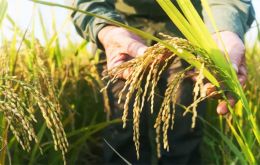MercoPress. South Atlantic News Agency
Tag: Brazil soybean
-
Wednesday, November 19th 2025 - 15:36 UTC
Brazil estimates another record harvest in 2025/26, totaling 354 million tons

Brazil’s 2025/26 grains and oil seed harvest is estimated should reach 354.8 millon tons, representing an 0.8% over the previous record harvest, according to the second survey by the country’s National Supply Company, CONAB, which was completed earlier this month.
-
Wednesday, October 8th 2025 - 09:29 UTC
Brazil's soybean shipments to China make up for Beijing's purchases from US

After China suspended purchases of soybeans from the United States between June and August, due to President Donald Trump's tariff war, other suppliers, such as Brazil and Argentina, have found a new niche, according to a survey by the American Farm Bureau Federation, which represents 6 million American farmers.
-
Monday, August 18th 2025 - 05:24 UTC
Record harvest of corn and soybeans in Brazil, more area sown and good weather

The 2024/25 corn crop in Brazil was estimated at a record 137.0 million tons by the National Supply Company (Conab) on Thursday; an increase of about 5 million tons compared to last month’s forecast.
-
Wednesday, May 21st 2025 - 08:05 UTC
Brazil’s command of soy markets tested by record crops and Argentina

Despite a record grains and oil seeds harvest, Brazil’s soybean trading has slowed significantly, because of the mismatch between buyers’ prices and suppliers’ expectations, points out Globo Rural, an agribusiness site.
-
Wednesday, January 15th 2025 - 08:47 UTC
Brazil’s 2024/25 harvest production estimated to reach 322.2 million tons, with soy exports of 105 million tons

Brazilian farmers should harvest 322,2 million tons of grains from the 2024/25 crop, representing an 8,2% increase over 2023/24, equivalent to an additional 24.5 million tons, according to the latest estimates from Conab, the county’s National Supply Company.
-
Thursday, October 17th 2024 - 12:27 UTC
Brazil expects a new record crop 2024/25, with rice experiencing the largest area growth

The first estimate for the coming 2024/25 grains crop in Brazil indicates a total production of some 322,47 million tons, according to Conab, the country's national supply corporation. If finally confirmed this would represent another record production, with a 8,3% increase over the previous 2023/24 harvest, equivalent to 24,6 million tons.
-
Wednesday, August 7th 2024 - 18:11 UTC
Brazil's 2024/25 soy crop could reach 165 million

Next mid September Brazil begins sowing the 2024/25 soybean harvest expected to reach a record harvest of 165 million tons, and export forecasts of 102 million tons, according to the agribusiness consultancy Stone X.
-
Saturday, March 9th 2024 - 09:04 UTC
Brazil leads the world in exports of seven food commodities

Brazil has become the global leader in the export of at least seven food commodities, following on a report distributed by BTG Pactual to its clients this week.
-
Thursday, October 12th 2023 - 07:44 UTC
Brazil expanding its soy area but corn production is expected to fall as prices drop

Brazilian farmers will have a record soy output in the new season as they are sowing the oilseed over a larger area, the government’s crop agency Conab said this week in the first forecast report for the 2023/24-grain cycle.
-
Thursday, September 14th 2023 - 11:54 UTC
As with soybeans and corn, Brazil ready to unseat US as world's top cotton exporter

As with other crops, Brazil is close to unseating the US to become the world’s biggest cotton exporter as Texas, America’s top-producing region, buckles under searing heat and drought.
